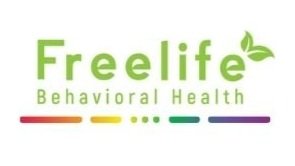
Neurodivergent Affirming Therapy
Therapy that feels like talking with someone who gets it—because we do.
At FreeLife Behavioral Health, we offer neurodivergent-affirming therapy with the understanding that every mind works differently—and that’s something to honor, not fix. Whether you’re on the Autism spectrum, have ADHD, or identify with another form of neurodivergence, our therapists approach your care with respect for your lived experience, communication style, and sensory needs. We recognize that navigating a world built for neurotypical expectations can be exhausting and invalidating. That’s why we create a supportive, nonjudgmental space where you can show up fully as yourself. Whether you’re processing trauma, burnout, masking, or challenges with relationships or self-worth, our therapists are here to walk alongside you with compassion, validation, and tools that work for you.
Therapy for LGBTQIA+ Individuals
at Every Stage of Your Journey
A Space for Honest Conversation,
Skill Building, and Resilience
Many neurodivergent individuals seek therapy not because there is something "wrong" with them, but because the world is often not designed with their brains in mind. Some common reasons neurodivergent people come to therapy include:
Sensory Overwhelm & Chronic Anxiety: Experiencing heightened sensitivity to sound, light, touch, or social stimuli, leading to frequent stress or shutdowns
Emotional Dysregulation & Shutdown: Feeling emotions intensely or struggle to identify and express them due to alexithymia, masking, or past invalidation
Executive Functioning Struggles: Struggling with task initiation, time management, memory, or transitions—not due to laziness or lack of motivation, but because of how your brain processes and prioritizes information
Difficulty Feeling Safe in Relationships: Feeling wary about trusting others or unsure how to advocate for your boundaries and needs
Trauma from Invalidation & Masking: Carrying trauma from years of trying to fit into neurotypical norms—constantly monitoring how you speak, behave, or feel in order to be accepted
You don’t need to change who you are—you deserve support that honors your lived experience and helps you thrive as your whole self.
Life comes with unique joys and challenges, and everyone deserves a safe, affirming space to explore their experiences. Our therapists are here to guide you with compassion and understanding. We proudly specialize in LGBTQIA+ affirming therapy while welcoming and supporting individuals of all backgrounds and identities.
Why Freelife BH for LGBTQ+ Affirming Therapy?
At FreeLife Behavioral Health, we go beyond simply offering inclusive care—we provide therapy shaped by shared experiences within the LGBTQ+ community. Our therapists understand the complexities of identity, relationships, and societal expectations because they’ve lived them too.
Through a blend of compassion and expertise, we aim to foster resilience, promote healing, and empower every client to embrace their authentic self. By addressing the unique challenges LGBTQ+ individuals and couples face, we help create lasting transformations and a sense of belonging in a world that doesn’t always make it easy.
More Than Affirming. We're Part of the Community.
Therapy at FreeLife is about understanding, connection, and growth. Our therapists, all members of the LGBTQ+ community, bring a unique perspective and deep empathy to their work. We provide a safe, inclusive space for individuals of all identities to explore, heal, and thrive, offering care grounded in authenticity and expertise.
At FreeLife Behavioral Health, neurodivergent-affirming therapy goes beyond treating symptoms—it’s about honoring your lived experience, understanding your unique brain, and helping you build a life that truly fits you. Together, we can:
Create a Safe Space: We provide a low-stimulation, judgment-free space where masking isn’t expected, and where you're free to show up exactly as you are.
Affirm Your Identity: We help you unlearn internalized ableism, embrace your strengths, and deepen self-understanding. Therapy is a space to affirm your experience—not explain it away.
Support Regulation: We help you develop tools for navigating sensory overload, emotional intensity, shutdowns, or meltdowns—not to “fix” you, but to support your wellbeing.
Heal from Past Experiences: We hold space for the grief, burnout, and trauma that often come with masking and chronic self-erasure—and we support your healing with care and gentleness.
Build Skills & Systems that Work for You: We work collaboratively to explore executive functioning supports, communication strategies, relationship skills, or daily routines that actually align with your brain—not neurotypical expectations.
At FreeLife Behavioral Health, therapy isn’t about changing who you are—it’s about helping you live more fully as yourself. We’re here to honor your truth, celebrate your strengths, and walk beside you as you create a life that works with your neurodivergence, not against it.
FAQs About Neurodivergent Affirming Therapy
-
A neurodivergent-affirming therapist supports and validates neurodivergent clients without trying to change who they are. They recognize neurodivergence as a natural variation in brain function—not a problem to fix—and adapt therapy to meet each client’s communication style, sensory needs, and lived experience.
-
The neurodivergent-affirmative approach centers acceptance, self-understanding, and empowerment. It rejects pathologizing differences and instead works with each person’s unique brain, honoring their needs and strengths rather than pushing neurotypical standards.
-
The best therapy for neurodivergent people is one that affirms their identity, adapts to their sensory and communication needs, and is rooted in respect and collaboration. There's no one-size-fits-all—what matters most is that the therapist is neurodivergent-affirming.
-
The neurodiversity-affirming model views neurological differences as natural and valuable, not as disorders. It emphasizes inclusion, self-advocacy, and support that helps neurodivergent people thrive without needing to mask or conform to neurotypical norms.
Getting Started is Easy
To get started, fill out the form below and we will reach out for your free consultation.







